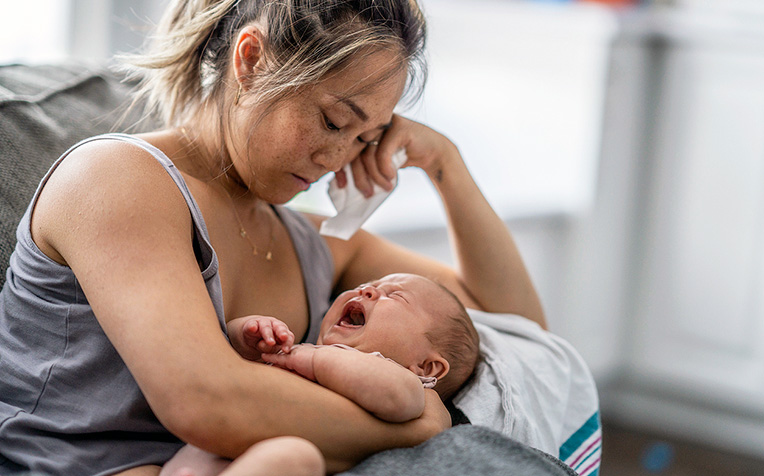Postpartum depression (PPD) generally hits someone after they have given birth. Most of the time, they don’t even know that what they are experiencing is actually PPD – many think they are simply exhausted after experiencing childbirth, and suffer in silence.
Depression in itself is horrible to experience – worse still during or after pregnancy. Many women, me included, experience PPD DURING pregnancy, and it’s completely normal. Many say pregnancy is one of the best experiences in life, because not only do you have the privilege of nurturing a tiny human inside you, but you can eat to your heart’s content, rest as much as you like without anyone pointing fingers, and get all the pampering from your loved ones.
Well, there’s no denying that it’s great to be pregnant, but let’s not get too delusional over the pampering and overlook the subtle warning signs of incipient PPD, such as: mood swings, lack of appetite, crying, feeling of loneliness, feeling that nothing makes you happy, being reluctant to be in the company of others, and much more. Sure, hormones play a significant role in triggering these emotions, but if it is prolonged, you know it’s beyond just hormones.
After I gave birth to my first child three years ago, I didn’t know why I became overly emotional. Just needed a shoulder to cry on and someone to listen to the hardships I was facing – without offering a plausible solution. Perhaps I didn’t want a solution, but just to vent my feelings without being judged an incapable new mom, an emotionally unstable new mom, a weak new mom, or a super dependable new mom. When these thoughts and feelings crowd your mind, your strength slowly collapses and you break down.

I used to not only cry it out, but felt horrible because I didn’t feel connected to my cute baby, like how you’re supposed to – love at first sight. It took me a couple of months until I could really feel connected to my child and actually be happy with what I had produced. I even wanted my child to be away from me for some time when things were starting to fall apart – emotionally. If you’re not a mom or are of the opposite gender, you may be quick to pass judgement, but in reality, many, many mothers face this. After going through it, I now know why it took me so long to finally mend that long-lost connection. That’s how long it took me to stabilize from PPD and regain the power to carry out my new role.

As for PPD during pregnancy, it hits some people because of the many uncertainties – unpreparedness, low self-esteem, lack of confidence, afraid of permanent changes to their lives, and fear they won’t be able to handle responsibilities once the baby comes. No doubt, the arrival of a baby brings utmost joy and happiness to one’s life, and there’s nothing in the world we would trade it for. But, with new responsibilities come a lot of insecurities, questions and thoughts bouncing in our heads. The fathers have their set of concerns and mothers have their own.
Usually, when a child is born, a new mom struggles to find the middle ground between her new life and managing the little infant. The responsibilities and duties for the new parents are extremely daunting. It takes time adjusting to sleepless nights and a new routine. Amidst all that chaos, imagine what a rollercoaster ride your emotions will be experiencing.
You may ask, why would a seasoned mom, who is having her second or whatever-number child, feel PPD during her pregnancy, when she already knows ‘the drill’? Well, when it comes to mental and physical health, no amount of experience can make someone ‘know the drill’. When it’s your second child, a different set of worries and concerns crowd your mind. “How will I be able to manage a toddle AND an infant?”, “Will I be able to get a helper in time?”, “How will we manage it financially”, “Do we have enough room, with the expenses to send our toddler to school just so I can focus on the baby?”, “How will I manage household chores, a toddler, an infant and myself all on my own?”
These are some intense questions that can simmer in your mind – until you are able to find solutions. And if you’re unable to find a way to brush these concerns off, the stress builds up, and eventually gets in your system. If it extends past a certain period, it weakens you emotionally and mentally, which leaves you experiencing PPD, during pregnancy.
There’s never a perfect solution to overcome or dodge PPD. The best way to reduce the impact is to be aware of it and embrace it. Many are not prepared for the ‘hidden’ emotions that hit them during or after pregnancy.
Now that many have voiced out and shared their experience openly, the term PPD is legit. If you’re experiencing PPD or emotional disturbance of any kind, do not be afraid to reach out to your loved ones or professional help. There are many ears willing to listen to your feelings and hands wanting to help. Most importantly, know that you are never alone and help is all around you.
More on pregnancy? Read this:
https://lipstiq.com/womens-health/193262/baby-steps-6-important-tips-for-an-easier-pregnancy/










